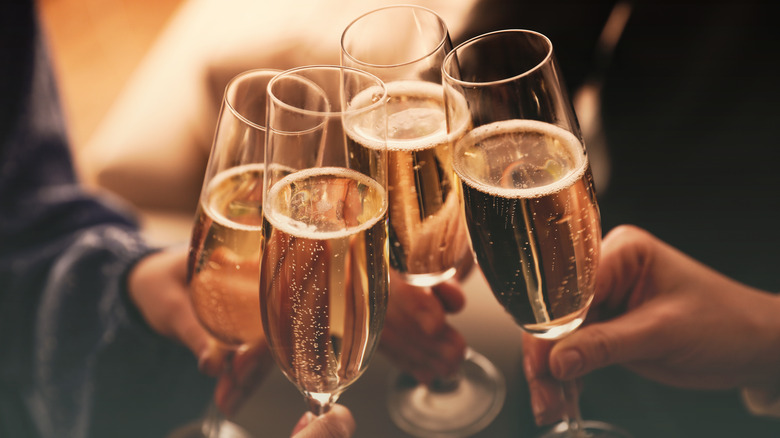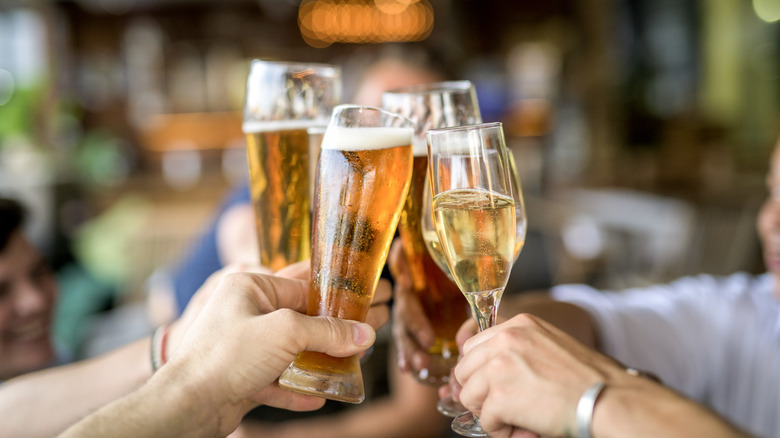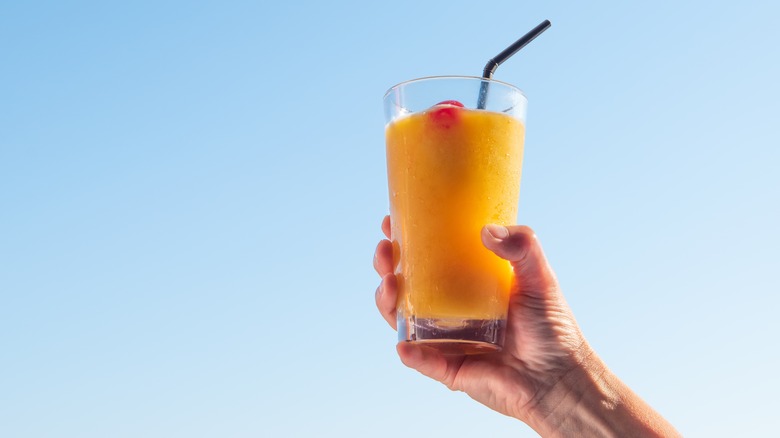The Strict Etiquette Rules For Clinking Glasses In France
The table is set, the cutlery is sparkling, the glasses are filled, and it's time to make a toast before the meal commences; hands are raised, glasses are swished and clinked, and 'cheers' is cried out. While the general order of things remains more or less the same across the globe, French etiquette requires guests to be more particular about how they toast before the revelry can begin.
Rather than clinking glasses and saying cheers to no one person on the table in particular, the French way of toasting requires that guests clink their glasses with every single person with whom they are drinking. Even more important is eye contact: Guests must meet the eye of the person with whom they are clinking their glasses. Failure to do so invites bad luck for the next seven years to come, the French say! Once toasts are raised and 'cheers' is said to every guest while holding their eye, it is best to wait until everyone else finishes doing the same too. Guests must then take a sip from their drinks before the glasses are put back on the table and the drinking formally begins.
What to remember before making a toast in France
According to legend, the custom of raising toasts began in medieval times to control poison. As glasses clinked and drinks inside swished into each other's cups, toasts were a way for guests to make sure that their drinks weren't poisoned. Eye contact further ensured that no one would peep to see whether their drinks got mixed or not so that all guests were equally incentivized to leave poisons off the table. Though the motives are less sinister these days, the art of toasting, or l'art de trinquer as it's known in France, is taken just as seriously.
Drinking before toasts are finished or putting a glass on the table in between are both huge faux pas, as is crossing arms with another guest holding a drink on the table. Raising a toast with a non-alcoholic beverage is another no-no — a nod to the Greek custom of drinking water to send the souls of the departed into the afterlife. What is said while glasses are clinked changes too: 'Santé' is the closest to cheers whereas 'à votre santé' is a toast to one's health. 'Tchin-tchin' gets its name from the Chinese word for please and is an informal way to urge guests to begin drinking, as is 'trinquons,' which literally means let's drink. If you hear 'cul sec,' however, be prepared to chug your drink. The equivalent of bottom's up, cul sec means it's time to empty the glass.
More toasting traditions from around the world
While the French place great emphasis on clinking glasses with each guest and maintaining eye contact throughout, it's not the only country with these customs: Raising a toast with water is equally unacceptable in Spain whereas eye contact is key in Germany, the Czech Republic, and Italy as well. In fact, it's not the only country with strict etiquette rules that guide when and how to raise a toast.
It's considered highly inappropriate to pour your own drink in both Japan and Korea. Custom dictates that you pour a drink for your neighbor first and then wait for them to pour you a drink in return. In China, deference is paid to elders when drinking. Elders are served first, their glasses always filled to the brim, and their hands always raised higher than those younger to them when clinking. Drinking during your own toast is another faux pas in most parts of the world.
While some of these drinking traditions may be tied to a society's general social customs, some toasting etiquettes are rooted in a country's history. For example, when Austria defeated the Hungarian Revolution in the 19th century, the event was celebrated with free-flowing rivers of beer. To this date, raising a toast with beer is considered to be a very disrespectful act in Hungary and not knowing this custom could cause quite the blunder!



